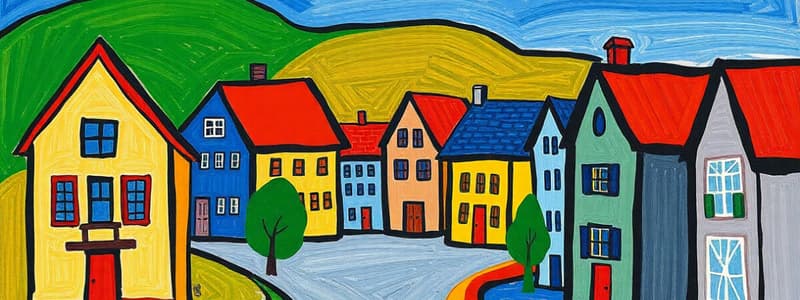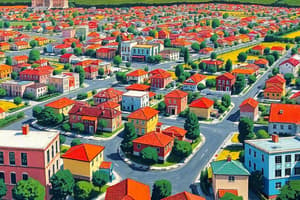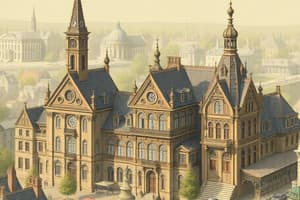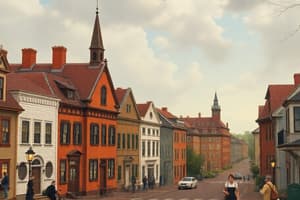Podcast
Questions and Answers
In New England, what are smaller political units often called?
In New England, what are smaller political units often called?
- Districts
- Counties
- Townships
- Towns (correct)
In many states, especially in the Midwest, what are smaller political units often called?
In many states, especially in the Midwest, what are smaller political units often called?
- Boroughs
- Villages
- Cities
- Townships (correct)
From where do town governments receive their authority?
From where do town governments receive their authority?
- The state (correct)
- The people
- The county
- The federal government
In New England, what do town governments primarily handle?
In New England, what do town governments primarily handle?
In early town meetings, who made the important decisions?
In early town meetings, who made the important decisions?
How often do residents in New England typically gather to discuss and vote on local issues?
How often do residents in New England typically gather to discuss and vote on local issues?
Town meetings are most useful for which of the following?
Town meetings are most useful for which of the following?
What are the officials called that New England towns elect to run local government?
What are the officials called that New England towns elect to run local government?
What replaced traditional town meetings in some New England towns?
What replaced traditional town meetings in some New England towns?
What do some towns have that runs the local government instead of meetings?
What do some towns have that runs the local government instead of meetings?
How did Congress divide the land?
How did Congress divide the land?
What are local governments called that settlers set up as they moved west?
What are local governments called that settlers set up as they moved west?
What body of officials do most townships elect?
What body of officials do most townships elect?
What has happened to townships as cities and counties have taken on more responsibilities?
What has happened to townships as cities and counties have taken on more responsibilities?
What is the smallest unit of local government?
What is the smallest unit of local government?
Why might community members set up their own village government?
Why might community members set up their own village government?
What does the government of most villages consist of?
What does the government of most villages consist of?
What is a main drawback of becoming a village?
What is a main drawback of becoming a village?
Flashcards
What are Towns?
What are Towns?
In New England, a unit of local government.
What are Townships?
What are Townships?
In many states, especially in the Midwest, a unit of local government.
Town governments in New England
Town governments in New England
Town governments handle the needs of most small communities.
What is Direct Democracy?
What is Direct Democracy?
Signup and view all the flashcards
Who are Selectmen?
Who are Selectmen?
Signup and view all the flashcards
What are Representative Town Meetings?
What are Representative Town Meetings?
Signup and view all the flashcards
What is a Town Council?
What is a Town Council?
Signup and view all the flashcards
What are Townships?
What are Townships?
Signup and view all the flashcards
What is a Township?
What is a Township?
Signup and view all the flashcards
What are Civil Townships?
What are Civil Townships?
Signup and view all the flashcards
What is a Village?
What is a Village?
Signup and view all the flashcards
What is a Village Board?
What is a Village Board?
Signup and view all the flashcards
What are Village Board Powers?
What are Village Board Powers?
Signup and view all the flashcards
Drawback of Becoming a Village
Drawback of Becoming a Village
Signup and view all the flashcards
Study Notes
Town Government
- In 1654, men in Sudbury, Massachusetts gathered to discuss how to divide land.
- People in Sudbury still meet to discuss town issues.
Towns and Townships
- In New England, smaller political units are called towns.
- In the Midwest and other states, these units are called townships.
- Counties are divided into smaller political units.
- Town governments get their power from the state.
New England Town Government
- Town governments handle the needs of small communities in New England.
- Counties are mainly judicial distrcits in New England.
- County and township governments share authority in other states with townships.
- Relationships between town/township and county governments vary.
Direct Democracy
- New England town government is one of the oldest forms of government in the US.
- Citizens, rather than elected representatives, made the decisions in early town meetings.
- Residents in New England meet yearly to discuss and vote on ordinances, taxes, and budgets.
Limitations of Town Meetings
- New England town meetings occur rarely.
- They are useful for broad policy making.
- They are not as useful for everyday government details.
Selectmen
- New England towns elect a group of officials called "selectmen" to run local government.
- Towns can also elect executives like a clerk and treasurer.
- The title "selectman" applies to both women and men now.
Representative Town Meetings
- Some New England towns have replaced traditional town meetings.
- Direct democracy became impractical as New England towns grew.
- Direct democracy became impractical as the government became more complex.
- Elected representatives make decisions instead of the people as a whole in meetings.
Town Council
- Some towns eliminated meetings altogether.
- They have a town council that runs their local government.
Township
- New York, New Jersey, and Pennsylvania's counties are divided into townships.
- Townships are smaller than New England towns.
- Townships have similar governments to towns.
Condition of Township
- Congress divided land into uniform square blocks when the United States expanded westward.
- The square blocks were usually six miles wide and six miles long.
- They were originally designed to be an hour’s buggy ride to the township hall for any resident.
Civil Townships
- Settlers moving west set up local governments called civil townships.
- Midwestern townships kept borders established by Congress.
- Many townships appear perfectly square on a map.
Township Committee
- Most townships elect a small body of officials.
- These officials are known as a township committee, board of supervisors, or board of trustees.
- They have legislative responsibilities.
- They usually hold regular meetings citizens can attend.
Less Important
- Townships have declined in importance.
- Cities and counties have taken on more township functions.
- County and township governments sometimes work together to provide local services.
Village Government
- A village is the smallest unit of local government.
- Villages usually lie within the boundaries of other local governments, like townships or counties.
- Communities with small populations may not need their own government.
- County or township governments provide for most of those communities' needs.
Village Government cont.
- Community members may be dissatisfied with county services.
- Community members may want to set up their own school system.
- Communities may organize as a village and request permission from the state to set up a village government.
Village Board
- The government of most villages has a small board of trustees elected by voters.
- Some villages elect an executive, called the chief burgess, president of the board, or mayor.
- Village boards have the power to collect taxes.
- Village boards can spend money on projects that benefit the community.
- Examples of projects include maintaining streets or sewer and water systems.
Advantages and Disadvantages
- The main drawback of becoming a village is higher taxes for residents.
- Higher taxes help support the extra layer of government.
- Becoming a village upgrades the community's status.
- It makes it more attractive to visitors, residents, and businesses.
- In return for higher taxes, residents get better services.
Studying That Suits You
Use AI to generate personalized quizzes and flashcards to suit your learning preferences.




